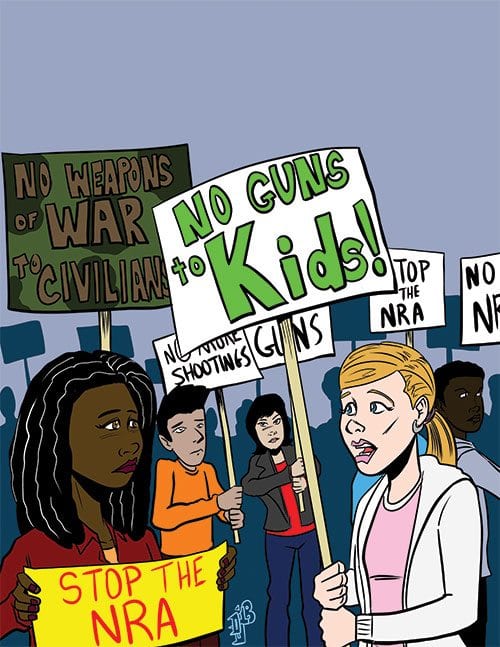
Mass murders are now commonplace in the U.S. Last Oct. 1, Stephen Paddock killed 58 people who were enjoying a concert in Las Vegas. A month later, a killer gunned down 26 parishioners in a Sutherland Springs, Texas church. And a distraught teenager recently shot and killed 17 fellow students at a high school in Florida. Students who are the emotional victims of the assault have been campaigning effectively to make it more difficult to acquire firearms. Their growing progress is mindful of the successful Montgomery Bus Boycott 62 years ago that advanced the Civil Rights Movement.
The National Rifle Association, the NRA, was established in 1871 to facilitate training in marksmanship. Since then it has grown in influence and reported revenue of $433.9 million in 2016. More than half its revenue comes from contributions from the estimated 3-to-5 million members. The NRA has become one of the most politically powerful organizations in the country, and opposes most legislation to limit access to firearms even for safety reasons.
The recent wave of mass murders has provoked public protests against the availability of firearms, but the NRA has taken its usual position in opposition to restrictions. This has generated a negative public attitude to the NRA as well as any of its supporters. A number of companies providing special benefits to NRA members have been caught in the crossfire. The rental car companies Hertz, National, Enterprise and Alamo have ended their programs. Insurance companies MetLife and Chubb have followed suit. Others are also cutting NRA ties.
Companies fear that customers who are dismayed by the Parkland, Fla. high school shooting will stay away from firms whose reputation is sullied by the NRA brand. It boils down to the loss of revenue. That is what turned the tide in the Montgomery Bus Boycott.
When Rosa Parks was arrested on Dec. 1, 1955 for sitting on a seat reserved for white passengers on a Montgomery, Ala. bus, blacks were ready to protest. The policy had been for blacks to pay their fare at the front, then leave and enter the rear door to sit in the back of the bus. Sometimes the driver would pull off if an infirm black passenger could not get to the back door fast enough.
Intimidation and arrests did not deter the citizen’s protest. Some were even fired from their jobs. The boycott did not end until Dec. 20, 1956. Blacks in Montgomery did not ride the buses for 381 days. The loss of revenue to the bus company for more than a year and not moral enlightenment influenced the policy to integrate.
Boycotts have not been favored as social change tactics because they require profound commitment, discipline and endurance. The grievance the people oppose must be extremely severe to provoke such committed opposition. In order to prevail, the Florida high school students will have to induce members of Congress to ignore campaign contributions from the NRA. That seems to be an almost insurmountable task.
All Americans will benefit from the establishment of reasonable firearms controls and the removal from society of the excessive number of guns. This is a worthwhile cause for the nation’s youth. Who knows what good can develop? An unanticipated boon from the Montgomery Bus Boycott was the emergence of Martin Luther King to become the most prominent leader of the Civil Rights Movement.


![Banner [Virtual] Art Gallery](https://baystatebanner.com/wp-content/uploads/2024/04/Cagen-Luse_Men-at-store-e1713991226112-150x150.jpg)



